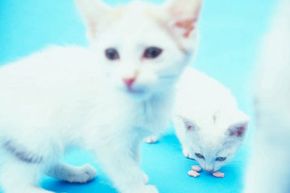 “White cats with blue eyes, yellow eyes or one of each are more likely to be born deaf. See more cat pictures.George Doyle/Stockbyte/Thinkstock
“White cats with blue eyes, yellow eyes or one of each are more likely to be born deaf. See more cat pictures.George Doyle/Stockbyte/Thinkstock
Owning a cat with hearing or vision impairment can be challenging but rewarding. Sometimes, treating or managing the condition depends on its cause and when it occurred. Hearing or vision impairment can be caused by a wide range of things, including accidents, disease, reactions to medication or a birth defect. Some cats are predisposed to being deaf at birth. An all-white cat has an increased risk of being deaf, for example. If he has blue eyes, the risk is greater. White cats with yellow eyes or one blue and one yellow eye (odd-eyed) also have a greater than normal risk of being deaf. Not all white cats are deaf, but most cats born deaf are white.
Some vision and hearing loss is treatable. For example, your cat can lose vision if he doesn’t get enough taurine. Taurine is an essential amino acid, and it’s necessary to maintain the health of your cat’s eyes. Without it, his retina will deteriorate, resulting in total blindness in two years. Switching to a food with adequate taurine will stop the deterioration, but there’s no way to reverse it. Veterinarians can diagnose taurine deficiencies through a blood test. Commercial cat food contains plenty of taurine, so sticking to that is your best bet. Other eye conditions, such as cataracts (cloudy lenses) can be corrected surgically. If your cat has hearing loss due to a condition such as impacted wax or a non-cancerous tumor, relieving the condition can restore his hearing.
As soon as you notice your cat becoming less responsive to sound, bumping into things or having eye problems, contact your vet for an evaluation so you can figure out the cause and the best course of treatment. If it’s not treatable or your cat was deaf or blind from birth, there are lots of things you can do to help him adapt to your home. Read on to find out more.
Treating Cats with Hearing or Vision Loss
Cats with hearing or vision loss can adapt well, especially if the loss occurred when the cat was young. However, you should never let a deaf or blind cat outside — he is at a serious disadvantage when not in the familiar environment of your home. Visitors and others in your household should be aware of your cat’s condition. Avoid making loud noises around a blind cat or sneaking up on a deaf cat.
Blind cats can figure out the layout of their home by touch. You may want to keep your cat restricted to certain rooms or levels of the house to keep him from falling down stairs or accidentally getting outside. Once a blind cat learns the lay of the land at home, try not to change anything. Keep food and litter boxes in the same place. A blind cat relies on landmarks that are at cat level — just a few inches off the floor — so even something as simple as leaving shoes in the hallway can throw him off. Blind cats love toys that make noise due to their heightened sense of hearing.
Deaf cats process the world through their sense of sight and touch, and they feel sound as vibrations. You may not be able to get your cat’s attention by calling his name, but you can stamp your foot or knock against a surface. Keep in mind that the thuds and crashes that would send a hearing cat running for cover are lost on a deaf cat. Try to provide your cat with safe forms of visual stimulation and remove anything dangerous such as breakable knickknacks.
It can be more challenging for both the owner and the cat if the animal becomes blind or deaf later in life. Your cat’s senses and body functions also slow down as he ages, and hearing and vision are no exceptions. Once a cat passes middle age (anywhere from six to ten years old), expect him to lose a little edge. The difference with an elderly cat whose vision or hearing has gone down is that his other faculties have diminished, too. It’s more difficult to adapt when you have a lifetime habit of relying on fully-functioning eyes and ears.
The most important ingredient is patience — your cat is doing the best he can. With your caring and sensitivity, your blind or deaf cat can live a full and happy life.
Lots More Information
Related Articles
- Home Remedies for Cats with a Cough
- Home Remedies for Cats with Dandruff
- Home Remedies for Cats with Diarrhea
Sources
- ASPCA. "Cat Care: Deafness." ASPCA. 2011. (April 28, 2011)http://www.aspca.org/pet-care/cat-care/deafness.aspx
- ASPCA. "Cat Care: Blindness." ASPCA. 2011. (April 28, 2011)http://www.aspca.org/pet-care/cat-care/blindness.aspx
- Eldredge, Debra M., et al. "Cat Owner’s Home Veterinary Handbook." Howell Book House. Dec. 10, 2007.
- McConnell, John. "Blindness in Cats." Pet Place. 2011. (April 28, 2011)http://www.petplace.com/cats/blindness-in-cats/page1.aspx
- McConnell, John. "Deafness in Cats." Pet Place. 2011. (April 28, 2011)http://www.petplace.com/cats/deafness-in-cats/page1.aspx
- Sachs, Andrea. "Q&A: Raising a Blind Kitty." Time. Dec. 23, 2010. (April 29, 2011)http://www.time.com/time/arts/article/0,8599,2037963,00.html





























